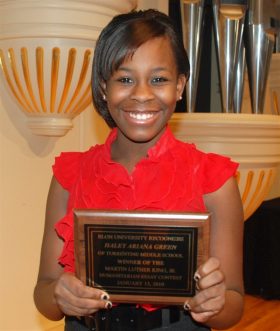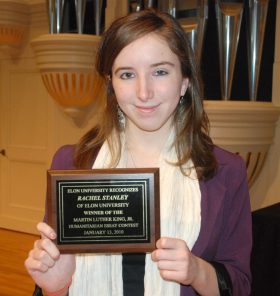Diversity isn't about the intention, "it's about the result," and as author and diversity speaker Lenora Billings-Harris shared Wednesday in Elon University's annual Martin Luther King Jr. Commemorative Program, today's students must use their knowledge and courage to continue building on the social progress made by previous generations of civil rights activists.
The noontime program in Whitley Auditorium is part of a weeklong series of events on campus to honor the life of the slain civil rights leader, who would have turned 81 on January 15. It included two piano performances by Soonsook Myung, a North Carolina musician with a doctor of musical arts in piano performance and pedagogy, and who has appeared as soloist, collaborator, duo-pianist, and lecturer throughout the United States.

“You know, there are some folks who say now that the United States has elected an African American president, Barack Obama, that racism and bigotry and all those things, we’re past that,” Billings-Harris said in her talk. “But I’m not sure that because we happen to have a black president, because we happen to have African Americans and people of color and women in all walks of life, I’m not quite sure that Dr. King’s legacy has been fully realized.”
She then quoted former South African President Nelson Mandela, who once said that a nation should be judged “not by how it treats its highest citizens, but by how it treats its lowest citizens.”
“Would you agree with me,” she said, “that we may still have a little work to do?”
Billings-Harris encouraged the audience to keep making efforts to learn more about people who are different, and to not be afraid to “make a mistake” by asking questions of people with different names, or backgrounds, or cultures.
Paul Parsons, dean of the School of Communications, preceded Billings-Harris on the stage, welcoming the audience on behalf of Elon University President Leo M. Lambert, who was in South Africa this week with a Winter Term study abroad program.

“Historical figures touch our lives in ways that we often don’t realize,” Parsons said. “At Elon, we come together every year in celebration of Dr. King’s life and legacy. Our university did not have its first African American students graduating until after Dr. King’s death. But due to the work of the Multicultural Center, the Watson Scholars program, and other initiatives, Elon can be proud today that the African American retention rate here is higher than the retention rate of the student body as a whole.
“Change for the good is happening, and we still have much work to do.”
Winners of Elon University’s Martin Luther King, Jr. Humanitarian Essay Contest, sponsored by the Multicultural Center with the purpose of promoting King’s vision for a more humane nation, were announced Wednesday as well. The contest is open to middle school students in Alamance County and, for the first time in 2010, to Elon students competing in their own category.
Haley Green of Turrentine Middle School took top honors in the middle school category. Rachel Stanley won first place in the university category.
Billings-Harris, a certified speaking professional and founder of Excel Development Systems, a consulting firm that specializes in helping businesses succeed through multicultural workplaces, has teamed with Fortune 500 companies, nonprofit organizations, educational institutions and government agencies. She previously worked for CIGNA and the General Motors Corporation, where she designed and developed management seminars and consulting services for various corporate and dealership populations.

Among her successes was the completion of the first management program for General Motors of Australia.
Author of The Diversity Advantage: A Guide to Making Diversity Work, Billings-Harris is past president of the National Speakers Association, an organization of more than 4,000 members. She currently serves on the board of the Global Speakers Federation and as an adjunct faculty member of the Bryan School of Business and Economics at the University of North Carolina – Greensboro, where she is part of an award-winning research team.
She received her undergraduate degree from Hampton University and a master of arts from the University of Michigan. Billings-Harris worked in the 1970s at Michigan in its Executive Development Center of the Graduate School of Business.


